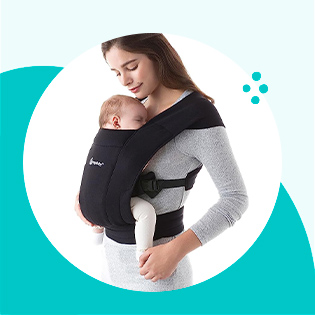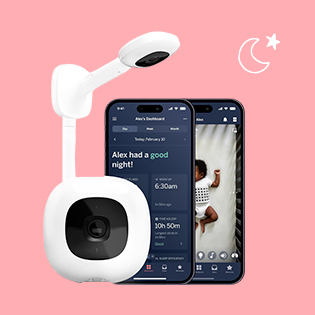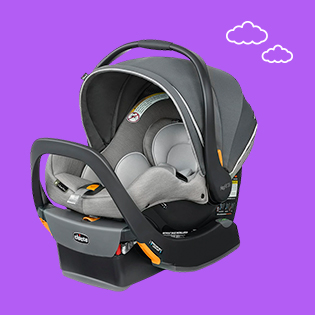Since the COVID-19 vaccine has been available for babies, toddlers, and young children, many parents have opted to vaccinate their little ones each year, like they would with the flu shot. Others, however, have held off, citing concerns about the shots' safety.
And you may be wondering whether or not to get the COVID-19 vaccine for your little one — especially since there are lots of conflicting guidelines, messages, and stories floating around about whether or not it's recommended and safe for kids.
But leading experts say it's important to vaccinate your child against COVID-19, and assure hesitant parents that the shots available are safe and effective with minimal-to-no side effects. As there have continued to be some COVID-19 hospitalizations among children every year, it's important to make sure your child is up-to-date on her immunizations.
"The COVID-19 vaccine still seems to be protecting kids from serious cases of COVID-19," says Gina Posner, M.D., a board-certified pediatrician at MemorialCare Medical Group in Fountain Valley, California, and member of the What to Expect Medical Review Board. "They are also studying whether it is protecting kids and adults from getting long COVID, and so far the studies seem to say it offers some protection. These are all reasons why I get my kids their updated vaccine yearly."
Among kids who do contract the virus, she says, it can reduce the risk of serious complications that require a trip to the hospital.
Here’s a look at everything we know about the COVID-19 vaccines for young children.
The COVID-19 vaccine for babies and toddlers protects young children from getting very ill from the virus, which is still circulating throughout the country. Children are eligible for the vaccine when they're 6 months old, and kids between 6 months and 4 years can receive either the Pfizer-BioNTech or the Moderna vaccine.
Everyone eligible for the vaccine can and should get it, leading experts say, even if they already had COVID-19. Right now, that includes pregnant women and other adults, as well as all children 6 months and older. Your child can get the COVID-19 vaccine at the same time as a flu shot too.
Research has shown that the COVID-19 vaccine is very safe. As with all vaccines, it's gone through a meticulous research and approval process to ensure its safety for both adults and children. In fact, the COVID-19 vaccines have had "the most intense safety monitoring in U.S. history," according to the CDC.
Can babies and children get the COVID-19 vaccine?
Yes, they can and should get an annual COVID shot if it's available, say pediatricians and other medical and health experts.
The Pfizer-BioNTech vaccine (marketed as Comirnaty) has full approval from the FDA for those 6 months and up.[1] The Moderna vaccine (marketed as Spikevax) has full FDA approval for babies and other children 6 months and older.[2]
Read This Next
In October 2023, the FDA also approved an updated version of the Novavax for the 2023-2024 season for emergency use for children and adults ages 12-plus, along with a new one for the 2024-2025 season.[3]
Unlike the Pfizer and Moderna vaccines, which are mRNA vaccines, the Novavax vaccine is a subunit protein vaccine. Subunit protein vaccines contain antigens that stimulate the immune system to launch a protective response against a virus.
The updated versions of the vaccine, which better targets the latest circulating strain or strains, were made available in September 2024 for everyone, including children aged 6 months and older. Children of all ages who are eligible should receive an updated version of the vaccine each year to stay protected, the CDC advises.[4]
In May 2025, current leaders from the U.S. Department of Health and Human Services (HHS), which oversees the Centers for Disease Control and Prevention (CDC), announced that they were reversing their stance on the COVID-19 shot for healthy children and pregnant women, saying they would no longer recommend that they get annual vaccines until more research was done. The American Academy of Pediatrics (AAP) and the American College of Obstetricians and Gynecologists (ACOG) denounced the decision and reaffirmed their support of the vaccine for children and during pregnancy.[5]
Previously, HHS and the CDC had aligned with the majority of the medical community and supported annual COVID shots for children 6 months and older, pregnant women, and all other adults. And even after the change of guidelines was announced, the CDC website, immunization schedules, and other information from the organization did not immediately reflect the new position.
Shortly after the announcement, the CDC said it was keeping the COVID-19 vaccine on its recommended immunization schedule, but did soften the language about it, saying children and pregnant women "may" get the annual shots rather than "should."
"After confusing, mixed messages from leaders at Health and Human Services (HHS) ... we are relieved to see that the U.S. Centers for Disease Control and Prevention (CDC) updated its schedules for child and adolescent immunizations to allow families to maintain the choice to immunize their children against COVID in consultation with their doctor," AAP President Susan Kressly, M.D., F.A.A.P., said in a statement about the CDC's decision to keep the vaccine on the immunization schedule.
The COVID-19 vaccine is still free for most kids in the U.S., and most health insurance plans will cover the vaccine at no cost to you.
"Including the vaccine on the schedule means the vaccine will be covered by insurance," the AAP's Dr. Kressly said. "This means many children and adolescents can access a vaccine to protect them from some of the serious complications of this disease, including long COVID."
If you don't have insurance or your plan doesn't cover the vaccine, you can get a free shot from a local provider enrolled in the Vaccines for Children program.
If your child is under 6 months old, you should take steps to protect her from COVID-19 and other illnesses until she's old enough to get vaccinated.
"With my first, I had a strict policy that if you didn’t have the flu, COVID, and TDaP [vaccines], you were not holding the baby," says What to Expect Community parent launchingmotherhood23.
Some parents request that relatives and other caregivers be current on their own vaccines before visiting their newborn babies.
"We are asking family to have COVID and flu boosters, plus confirm their TDaP is up-to-date," says What to Expect Community user Callie72.
Want more info on your baby's vaccines? Find it in the What to Expect app, where you can get tips, keep up with vaccines and doctor's appointments, and connect with parents.
How long should my child wait between doses of the COVID-19 vaccine?
Babies and toddlers can get either vaccine (Moderna or Pfizer-BioNTech), depending on availability in their area and their families' preference, the CDC says.
Dosing schedules for children ages 6 months through 4 years will differ based on the type of vaccine your child gets, along with whether she has already gotten a COVID-19 shot in the past.
According to the CDC, children between 6 months and 4 years old are considered up to date on their COVID-19 vaccines when they’ve had the following:[6]
- If your child hasn’t had a COVID-19 vaccine before: two doses of the 2024–2025 Moderna vaccine or three doses of the 2024–2025 Pfizer-BioNTech vaccine
- If your child has had at least one dose of the Moderna vaccine: one dose of the 2024–2025 Moderna vaccine
- If your child has had one dose of the Pfizer-BioNTech vaccine: two doses of the 2024–2025 Pfizer-BioNTech vaccine
- If your child has had two or more doses of the Pfizer-BioNTech vaccine: 1 dose of the 2024–2025 Pfizer-BioNTech vaccine
Kids between the ages of 5 and 11 are considered up to date when they’ve received at least one dose of either the 2024-2025 Moderna or Pfizer-BioNTech vaccine.
The newest batch of COVID-19 vaccines, released in September 2024 are monovalent, meaning they only target the latest circulating strains.
So even if your child hasn't been vaccinated in the past, they'll be well protected, since the original strain of COVID-19 and other earlier variants are no longer in circulation, the AAP says.[7]
Can my child get the COVID-19 shot at the same time as another vaccine?
It’s perfectly fine for your child to get the COVID-19 vaccine at or around the same time as another routine vaccine, including the flu shot, says the AAP.[8]
There are no increased risks of side effects from getting the COVID vaccine along with the flu shot or other vaccine.
Should children get the vaccine if they already had COVID-19?
The CDC stresses that everyone eligible for the vaccine should get it, even if they already had COVID-19. Right now, that includes pregnant women and other adults, as well as all children 6 months and older.
It’s true that the body gains some protection from COVID-19 after infection. But experts don’t know for sure how long that protection actually lasts. Getting the vaccine may make you less likely to get COVID-19 again, the CDC adds.
Talk to your pediatrician about how long to wait between a case of COVID-19 in your child and getting the vaccine. The current recommendation is to wait about 90 days after being sick with COVID to get the shot.
Does my child need a COVID-19 booster shot?
Every child aged 6 months or older should get an updated COVID-19 vaccine, the CDC recommends. Similar to annual flu shots, the updated vaccine targets the latest circulating strains of COVID-19, offering the best protection against the virus in any given season. If your child hasn't yet been vaccinated at all, she may need an additional dose or two for maximum protection, so talk to your doctor about what's recommended.[9]
Experts used to refer to subsequent COVID shots as "boosters" that babies, kids, and adults got after receiving their initial vaccine. Those later shots enhanced or restored the protection that the original COVID-19 vaccine offered.
Now that experts know more about how the virus changes each year, COVID vaccines are treated like annual flu shots and are no longer known as "boosters."
"Each year, there's an updated version of the shot that we'll be encouraged to get each fall to best protect against the current strain," says Rajeev Fernando, M.D., an infectious diseases consultant based in Southampton, New York, and a member of the What to Expect Medical Review Board.
Are the COVID-19 vaccines safe for infants and young children?
Yes. As with all vaccines, the COVID-19 vaccine has gone through a meticulous research and approval process to ensure its safety for both adults and children. In fact, the CDC says the COVID-19 vaccines have had "the most intense safety monitoring in U.S. history."[10]
Safety surveillance of more than 245,000 COVID-19 vaccine doses given over the course of nine months to children under 5 also did not show any adverse events in the 21 days after vaccination, which mirrored clinical trial results of the Pfizer-BioNTech and Moderna vaccines, according to a June 2023 Pediatrics review.[11]
"The AAP has pushed for rigorous studies in children so we know the vaccine is safe, effective, and the right dose," says AAP spokeswoman Jen Trachtenberg, M.D., an assistant clinical professor of pediatrics at Mount Sinai's Icahn School of Medicine in New York City.
There's also no need to worry that the mRNA technology used in the Pfizer-BioNTech and Moderna vaccines will change your child’s DNA. That's because mRNA is unable to enter the nucleus of the cell, where our DNA lives. Plus the mRNA is broken down by the body shortly after a person is vaccinated, according to the National Institutes of Health (NIH).[12]
Does the COVID-19 vaccine cause myocarditis in children?
There were no reports of myocarditis — an inflammation of the heart muscle — from either vaccine in the clinical trials for children ages 5 to 11. And the June 2023 Pediatrics review found no reports of myocarditis among children under 5.
A very small number of adolescents and young adults have experienced mild cases of myocarditis after receiving the COVID-19 vaccine. That said, becoming infected with COVID-19 is much more likely to cause myocarditis than getting the vaccine, according to the AAP.[13]
Myocarditis can occur when the body’s immune system reacts to an infection or another trigger. Symptoms of myocarditis include:
- Abnormal heart rhythms (feelings of a fast-beating, fluttering, or pounding heart)
- Shortness of breath
- Chest pain
Post-vaccine cases of myocarditis and pericarditis — an inflammation of the outer lining of the heart — have occurred most often in males, after the second dose, and within a week of inoculation. Most patients recovered quickly with rest.
Can the COVID-19 vaccine give my child the virus?
No. The COVID-19 vaccine works much like other routine immunizations that children get. It contains molecules with a set of instructions that teach the immune system to make its own protective antibodies, which can fight the germs that cause the virus, says the AAP.
But the vaccines don’t contain the actual virus itself. "There’s a zero chance of someone getting COVID-19 from the COVID-19 vaccine," Dr. Fernando says.
If a child (or adult) feels a little under the weather after being vaccinated, that doesn’t mean she has COVID-19. Instead, she is experiencing normal side effects that can develop as the immune system kicks into high gear to launch a protective response against the virus.
What side effects might a baby or young child experience after COVID-19 vaccination?
Side effects for both the Pfizer-BioNTech and Moderna shots have been shown to be similar to the types of mild, short-lived side effects your infant, toddler, or young child might experience from other vaccines.
Fever and soreness at the injection site were most common; babies and toddlers under 3 years old may also be sleepy, irritable, or have less of an appetite, while children 3 to 5 years old might feel low energy, have a headache, or experience flu-like symptoms.
These side effects can be a little inconvenient — fussy, cranky babies and toddlers aren't fun. But experts agree that protection against COVID-19 is worth a day or two of discomfort.
"The problem with COVID is that we just don't know who will get really sick and who will not get sick at all," Dr. Posner says. "I would prefer my child get mild side effects from a vaccine and hopefully get decent protection from severe illness versus taking the chance."
Wondering about the shots' impact on bigger kids? As with adults, the most common side effects in adolescents and older children are a sore arm, fatigue, headache, chills, fever, and muscle and joint pain, the FDA notes. Side effects don’t seem to be stronger or more prevalent in kids, and many haven’t had side effects at all.
As with other vaccines, it’s possible but very unlikely for a child or adult to experience an allergic reaction to the COVID-19 shot. These reactions are extremely rare, but when they do occur, it's usually shortly after immunization. That’s why everyone who gets the vaccine should wait about 15 minutes before leaving the facility where they received the shot. If an allergic reaction happens, medication can quickly treat it.
As for longer-term side effects? In general, serious side effects that could cause long-term health problems are extremely rare after any immunization, and the same has been true for the COVID-19 vaccine, the CDC says.[14] If parents have any concerns after their children receive the vaccine, they should check in with their pediatricians.
Are the COVID-19 vaccines effective in infants and young children?
Yes. While the COVID-19 vaccines won’t always prevent your little one from catching the virus, they’ve been shown to reduce your child’s risk of hospitalization or serious illness.
According to the CDC, the 2023-2024 vaccines provided about 50% additional protection against hospitalization for the first four to six months after vaccination, with longer-term protection from critical illness. The 2024-2025 versions of the vaccine have been designed to target the current variants and are working well, the CDC says.[15]
Research has shown that the vaccines can reduce the risk of hospitalization among babies and young kids. A 2023 JAMA study that looked specifically at the Pfizer-BioNTech vaccine estimated that the immunization reduced hospitalization rates by 33% among children ages 6 months to 4 years.[16]
The Pfizer-BioNTech vaccine is also effective at preventing severe illness in bigger kids. One study published in the New England Journal of Medicine found that kids ages 5 to 11 who had received two shots of the vaccine were 68% less likely to land in the hospital during the Omicron surge than their unvaccinated peers.[17]
Another study published in the New England Journal of Medicine found that two doses of the Moderna vaccine produced a strong immune response in the 6- to 11-year-old age group.[18]
Why is it so important for children to get the COVID-19 vaccine?
First and foremost, it will protect your child’s health. "The vaccine is the best way of not getting COVID-19," says Dr. Trachtenberg. Vaccines also reduce the chance of serious illness and/or hospitalization for children who do contract the virus, Dr. Posner adds.
It’s true that kids are less likely to get seriously sick compared to adults. But they can still catch the virus and spread it to others, even if they don’t show COVID-19 symptoms.
Millions of children have come down with the virus since the start of the pandemic. In rare instances, kids can develop severe complications that require hospitalization, intensive care, or a ventilator. Some studies have also shown an increase in new-onset autoimmune diseases after having COVID-19.[19]
Vaccinating your child also protects others in the community who may not be able to get immunized or who are more at risk of serious illness, says Dr. Fernando.
In short? "Vaccinations save lives," Dr. Fernando says.
Why weren't children included in the first COVID-19 clinical trials?
Children's immune systems are different from those of adults, and their immune responses can vary according to their age, explains Sean O'Leary, M.D., M.P.H., vice chair of the Committee for Infectious Diseases at the AAP and professor of pediatric infectious diseases at the University of Colorado Anschutz Medical Campus/Children’s Hospital Colorado.
While a teenager may respond to a vaccine in a similar way as an adult, a younger child, toddler, or infant could have a different reaction. That’s why it's so important to hold clinical trials in kids separately.
The trials in children go through two stages. The first stage looks at different dose levels, explains Dr. Fernando. As a next step, those doses are then tested against placebo injections.
About 24% of the U.S. population is under 18 — which amounts to around 74 million people. That's another reason experts say getting kids vaccinated is important in preventing severe illness and hospitalization.
Parents can get their little ones vaccinated at pediatrician offices, pharmacies, federally qualified health centers, local health departments, clinics, and other locations around the country.


















































